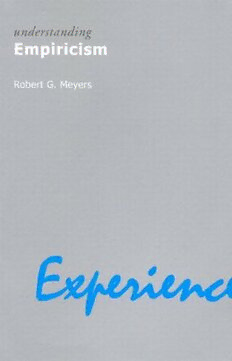Download Understanding Empiricism (Understanding Movements in Modern Thought) PDF Free - Full Version
Download Understanding Empiricism (Understanding Movements in Modern Thought) by Robert G. Meyers in PDF format completely FREE. No registration required, no payment needed. Get instant access to this valuable resource on PDFdrive.to!
About Understanding Empiricism (Understanding Movements in Modern Thought)
Understanding Empiricism is an introduction to empiricism and the empiricist tradition in philosophy. The book presents empiricism as a philosophical outlook that unites several philosophers and discusses the most important philosophical issues bearing on the subject, while maintaining enough distance from, say, the intricacies of Locke, Berkeley, Hume scholarship to allow students to gain a clear overview of empiricism without being lost in the details of the exegetical disputes surrounding particular philosophers. Written for students the book can serve both as an introduction to current problems in the theory of knowledge as well as a comprehensive survey of the history of empiricist ideas. The book begins by distinguishing between the epistemological and psychological/causal versions of empiricism, showing that it is the former that is of primary interest to philosophers. The next three chapters, on Locke, Berkeley, Hume respectively, provide an introduction to the main protagonists in the British empiricist tradition from this perspective. The book then examines more contemporary material including the ideas of Sellars, foundations and coherence theories, the rejection of the a priori by Mill, Peirce and Quine, scepticism and, finally, the status of religious belief within empiricism. Particular attention is paid to criticisms of empiricism, such as Leibniz's criticisms of Locke on innatism and Frege's objections to Mill on mathematics. The discussions are kept at an introductory level throughout to help students to locate the principles of empiricism in relation to modern philosophy.
Detailed Information
| Author: | Robert G. Meyers |
|---|---|
| Publication Year: | 2006 |
| ISBN: | 9781844650590 |
| Pages: | 192 |
| Language: | English |
| File Size: | 2.688 |
| Format: | |
| Price: | FREE |
Safe & Secure Download - No registration required
Why Choose PDFdrive for Your Free Understanding Empiricism (Understanding Movements in Modern Thought) Download?
- 100% Free: No hidden fees or subscriptions required for one book every day.
- No Registration: Immediate access is available without creating accounts for one book every day.
- Safe and Secure: Clean downloads without malware or viruses
- Multiple Formats: PDF, MOBI, Mpub,... optimized for all devices
- Educational Resource: Supporting knowledge sharing and learning
Frequently Asked Questions
Is it really free to download Understanding Empiricism (Understanding Movements in Modern Thought) PDF?
Yes, on https://PDFdrive.to you can download Understanding Empiricism (Understanding Movements in Modern Thought) by Robert G. Meyers completely free. We don't require any payment, subscription, or registration to access this PDF file. For 3 books every day.
How can I read Understanding Empiricism (Understanding Movements in Modern Thought) on my mobile device?
After downloading Understanding Empiricism (Understanding Movements in Modern Thought) PDF, you can open it with any PDF reader app on your phone or tablet. We recommend using Adobe Acrobat Reader, Apple Books, or Google Play Books for the best reading experience.
Is this the full version of Understanding Empiricism (Understanding Movements in Modern Thought)?
Yes, this is the complete PDF version of Understanding Empiricism (Understanding Movements in Modern Thought) by Robert G. Meyers. You will be able to read the entire content as in the printed version without missing any pages.
Is it legal to download Understanding Empiricism (Understanding Movements in Modern Thought) PDF for free?
https://PDFdrive.to provides links to free educational resources available online. We do not store any files on our servers. Please be aware of copyright laws in your country before downloading.
The materials shared are intended for research, educational, and personal use in accordance with fair use principles.

